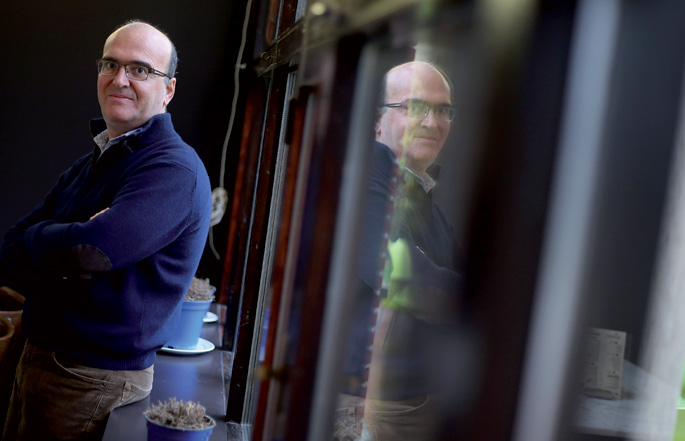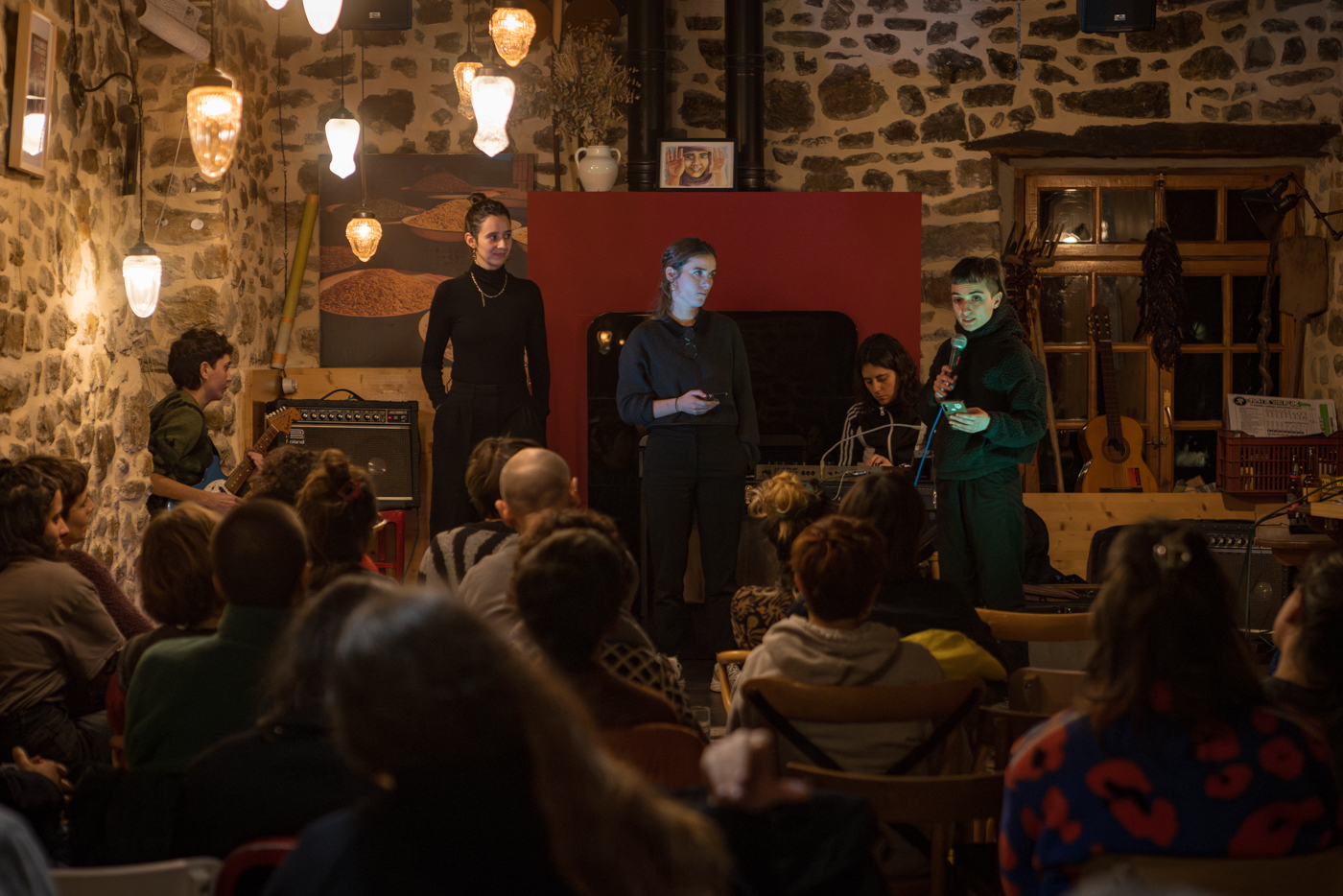"The Kingdom of Navarra is a metaphor for our desires and impossibilities"
- (Pamplona, 1960) The Kingdom and faith give the trilogy a shot at the end of the novel Dec. Jerusalem galdua. He has not therefore written merely historical work. It's also a great author's work. “My model is not to write a classic story novel, it is the model of Marguerite Yourcena or Alejo Carpentier, but I am neither. Of course, I’d like to get a little closer to her work,” she said humbly.

We have talked about the title of the trilogy Kingdom and faith. A parallel can be made to several issues of the past and the presente.Se can read independence and socialism, for example: “Yes, there is a game and parallelism, sometimes intentional and other unconscious. For example, in my second reading I see many other things that I did not realize in the first writing. Writing control is a tremendous task, many things are uncontrollable. In a trilogy, the logical forces imposed on the writer appear. In this case they have imposed on Aingeru. Sometimes I realized that what I was writing wasn’t me, that another was pulling the rope, that it’s been in the yoke with Aingeru.”
After the contemporary Rock’n’ roll (2000) novel, you started in the trilogy Kingdom and faith. Everyone must believe in themselves!
I don't know if it's a matter of faith, but yes, I was strong. However, it's curious, I took the measure from the beginning, I already knew the approximate size of the work. In the previous novels I had foreseen less details. I was leaving without a map, not knowing what I was going to be. In this, I had a map. Of course, I've never left without seeing the goal or the end, and in this I knew where the collates were, where the plateaus, where the hillsides, what the last back would look like. I understood, above all, the duration. I started drawing the story about paper and seeing the main events. It's true -- when I saw it was going to be an eight- to ten-year job, I was kind of scared.
However, go ahead. What's driving them? Why?
Ten years ago, he lived a kind of revival of the Conquest of Navarra. They began publishing the first books of history and working on the debates among history buffs. In addition, I was struck by the fact that history books were to some extent “militants.” They were studying history, but not just the story out of curiosity, they were proposing a mirror to interpret the current reality. That excited me. I'm not a historian, but I'm a storyteller. The books that were published and the discussions helped me a lot to get to work.
You have worked hard to draw the characteristics, customs and characters of historical people.
Despite the great help I have given him, the desire for this trilogy arose 20 years ago, when I read the biography of King Henry III of Navarre. Written by François Bayrou (President of the French party MoDem). Curious? I found the book in Biarritz and I took it with amazement: Written by Bayrou! This led me to read other biographies. I was surprised! Henry III is the most famous King of Navarre in Europe, with over 150 biographies written. He is considered a first-rate historical character from France and around the same person who has built all kinds of different characters. I read two biographies, and it seemed to me that they were talking about different people. So by the time I started the trilogy, I had already done the great reading of that time. Obviously, history books don't tell you what the people were like at the time. So I've taken people's ideas and characters out of their historical facts to build characters. For example, they were ferocious and primary people, far below them, and even noble ones were primary.
Historical novels are well received, but they are also considered of a lower level in literature. Is it appropriate to delve into history to make literature?
It's an option. Playing with history has its rules: How far can you insert fiction into a historical moment? The first rule is to respect the historical moment. You can't insert your obsessions and prejudices. You can't take a 21st-century character to a historic time. That's why some historical novels don't work. The literature in which I believe is not only for having fun and spending time, it has to express something. To achieve this you have to be very faithful to those who want to lead to the work, while that has to be a mirror of your time.
In his work the characteristics of the politicians then are the mirror of those of today or today.
Well ... [Thank you for these words]. On the one hand, this serves us to see how far away they are and how current the minds of the characters then are. They have, however, a strange point. Some reader has told me: “How hard it is for me to enter the minds of these characters, that faith in religion...” But beliefs, religions, religions, how far away we are. Others have told me: “How dark Pamplona is!” Today's Iruñea is not as dark as today's, OK. But are we so different?
The life of Joanes Mailu is the axis of trilogy.
Yes. He is the central character, especially in the second book. Since I was, the name of the royal book of Navarre belongs to him. It was Bastarta, however, who claimed a number of rights, especially that of the virtue of the fact that I worked on the first book. The biographies read in some way draw the character. But he's not the hardest character. We can know what it was like, but what kind of person was the one who put his shoes on, the arcabucero or the one who, while he was with his lover, guarded by the door? Some historian has told me: “The people then weren’t like that.” Yes. Of course, each can build characters as he imagines them.
What a character! Has there been anything like her in history?
Yes. One reader said: “Doesn’t that happen to you too much?” “Read the biography Henrike III.aren,” I said. It's terrible. How many things had left him in life! He lived 56 years and lived many things. You read the biographies of several kings, and before he turned 30, they were powerful men, and then they had many more experiences. In addition, Joanes Mailu is a bastard, but we are all bastards. We would not, then, be very different from us. We have to take this vastness with pride, no one is pure race, and we must not be pure race. I don't want to.
“Reading the story, it is clear that the Kingdom of Navarre had no future,” you said after the publication of the novel Joanes Mailu.
I said it in the interview I did and I got stuck. “Was the Kingdom of Navarre not entitled?” they told me. “I don’t talk about rights.” Some confuse the “need” of Navarre with history. I have not written on points of law, I have told the story by fiction. Let us return to the present, let us look at geopolitics, which we have been living in for two centuries between the clash of France and Spain. It was difficult for the Navarros at the time to come out well and, for “us” today, also to adapt in Europe. Suppose that what happened to Andorra happens to us. That is, just as the two great kingdoms forgot about that land, we forget about ourselves. But the Kingdom of Navarre was too big and too important for the people here to forget. Our five – the passages – were difficult to interrelate between the two sides, and also huge for the future and interests of the two great kingdoms.
The socio-political situation of that time undoubtedly tends to bring it to the present day.
There is a debate on the legitimacy of the Kingdom of Navarre. And it's interesting to see what the situation was like before. It was different, and now it is too. History doesn't write about what's going to happen next: what we were and what we are is different. History is spinning, and in the future, situations can also change. I find that interesting. But the Kingdom of then has come to the present and has transformed itself ... The statues of the time were terribly liquid, it is not appropriate to look at the current situation from the eyes of that time.
If that Navarre had become a state, how would you have imagined it?
If the kingdom had subsided, what kind of inheritance would we have received? It seemed to me that we would have been absolutely surprised. We would be a very castilized kingdom, the Basque would be very entrenched. According to Asisco in reference to Gartxot, in the old conquest, the erdality was deeply rooted in the upper nobility. There is, for example, no difference between the Agrammonites and the Beaumonteses. The Kingdom of Navarre is a metaphor for our desires and concerns.
Are we on the brink of the lost past?
Our past is not fixed by anyone, we have a sad past, we don't have a bright past. People have to be alarmed, and I understand that. I say to him that we must be proud of our sad past. Proud of that. That's our past. And what? We have something to learn. I believe that ours is not a model to go to it, but to move away from it, our history has to be an incentive to be who we are or want to be.
In our novel Jerusalem galdua is Pedro Agerre Axular. Is it known?
From the eyes of today he is a canonical writer, the best classic, the most quoted, the most praised. How has the figure of Axular acquired popular knowledge? Popular classic stories about him... [He has made a kind of grunt], and the people saw them of wisdom, and by the fact of dressing themselves of wisdom, by the devil. That is, knowing a lot for the people is not good. This is my lección.Axular is our most praised classic writer, but we know little about it. Luis Villasante wrote the leaflet of Axular, but biographical data occupy three pages. In addition, the veracity of these data has been discussed. So we know where and when it arose, when it was ordered, when it came to Iparralde. When he published the book Gero and when he died. But what do we know about its character?
It is difficult to complete the character of historical people.
Axular’s historical political context is known, but his biography has some surprising aspects, so we don’t have the data that they can reveal to us. I've invented an Axular, my Axular. It can be brave and it has some provocation. But that's what everybody does. “I guess I wouldn’t be an agent of the Spaniards,” I think. There is no doubt that he was an ultracatolic agent. All the ultracatolics in the north maintained close relations with the Spaniards. How much money was spent from Pamplona on the nobles of Donibane Garazi, Donapaleu or Ezpeleta? The Spaniards had formed a shield through them. Axular was involved, I think it was an ideological agent, a propagator of an idea. Well, I wanted to make a game, I proposed to my Axular. Is it credible? Some will not believe it. Somebody said to me: “You’ve invented such a character and you’ve believed it was like that.” Well, yes.
The language you've used is the model I like.
Others have been made insatiable. I'm very aware that with that model of language, I limit my audience, I decrease it. It's my bet, because these books need that language.
You've written 1,000 pages. Isolate yourself from today's world and fictional history to that size. You do not have much merit. Congratulations.
Yes, there's work, I've spent many hours. I have the ability to disconnect, sometimes exaggerated, can be said by others. It is true that living this kind of moment has its consequences, problems with others. For ten years I have not left my job as a translator. I'm a late writer, especially on weekends. I work at night, rehearsing until dawn. I can confess: I've finished bursting, and touched psychologically, I've left part of my health. To say that I've talked about my bodies and my soul is not a metaphor.
Astelehen honetan hasita, astebetez, Jon Miranderen obra izango dute aztergai: besteren artean, Mirande nor zen argitzeaz eta errepasatzeaz gain, bere figurarekin zer egin hausnartuko dute, polemikoak baitira bere hainbat adierazpen eta testu.
Martxoaren 17an hasi eta hila bukatu bitartean, Literatura Plazara jaialdia egingo da Oiartzunen. Hirugarren urtez antolatu du egitasmoa 1545 argitaletxeak, bigarrenez bi asteko formatuan. "Literaturak plaza hartzea nahi dugu, partekatzen dugun zaletasuna ageri-agerian... [+]
1984an ‘Bizitza Nola Badoan’ lehen poema liburua (Maiatz) argitaratu zuenetik hainbat poema-liburu, narrazio eta eleberri argitaratu ditu Itxaro Borda idazleak. 2024an argitaratu zuen azken lana, ‘Itzalen tektonika’ (SUSA), eta egunero zutabea idazten du... [+]






















ilbeltza-(1).jpg)